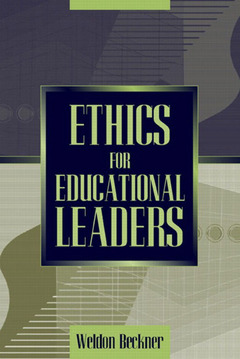Ethics for educational leaders
Auteur : BECKNER Weldon

Appropriate to all levels of professional development for educational leaders, this brief book emphasizes the practical application of contrasting philosophical and ethical concepts to realistic educational leadership challenges. Recognizing that educational administrators are required to make decisions in problem situations without ideal solutions, the major purpose of the book is to provide a philosophical and theoretical base along with practical suggestions and activities to use that foundation in making the best decisions possible in difficult situations. Throughout this book five main objectives are presented to guide the student, emphasizing the practical uses of philosophy and ethics by educational leaders.
SECTION I.
1. Introduction.Purpose of This Book.Purposes of This Chapter.Definition of Ethics.Some Ethical Questions.Objectives of This Book.Historical Preview.Contributions from Non-Western Thought.2. Philosophical Concepts Important to the Study of Ethics.
Rights.Freedom.Responsibility.Duty.Justice.Equity.
SECTION II. ETHICAL THEORIES AND PHILOSOPHICAL DOMAINS FOR ASSESSING ACTIONS.
3. Objectivism and Deontology.The Ethical Theory of Moral Objectivism.Action Guide: Deontology.Variations.Arguments for and Against Objectivism and Deontology.4. Relativism and Teleology.
The Ethical Theory of Relativism.Action Guide: Teleology.Arguments for and Against Relativism and Teleology.5. Axiology (Value Theory) and Motive (Character).
Ethical Theory: Axiology (Value).Action Guide: Motive (Character).Arguments for and Against Axiology and Value Theory.
SECTION III. ETHICAL DECISION-MAKING PROCESS.
6. Making Ethical Decisions.Distinguishing Right and Wrong from Ethical Dilemmas.Dealing with Ambiguity.Types of Dilemmas.Pressures Which Create Dilemmas.Organizational Purpose and Context Considerations.Approaches to Making Ethical Decisions.Codes of Ethics.Other Suggestions.7. Religion and Ethics.
The Importance and Implications of Background Beliefs.Religion and Morality.Barriers to Faith-Based Ethics.Appreciation for the Value of Religion.Natural Law.Manifestation of Religious Belief.Conclusion.8. So What? Conclusions and Suggestions.
The School as an Ethical and Democratic Community.Questions to Guide Ethical Decision-Making.Religious Perspectives.Servant Leadership.Aspiration Ethics.Ethical Bricolage.Core Values (Principle Ethics).Concluding Reflections.Choosing a Model.
Date de parution : 07-2003
Ouvrage de 176 p.



